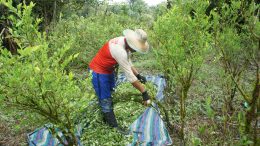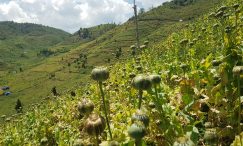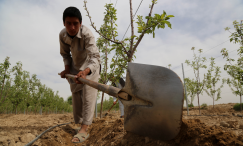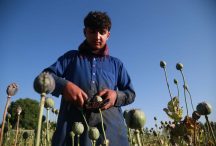Register for six seminars on illicit economies, violence and development

Militias at the margins: implications for post-war stabilisation
Militias are often long-term political actors of post-war frontier areas. central to how states and markets function. What does this imply those making and implementing security policies?

Crop substitution challenges in environmentally protected areas in Colombia
María Alejandra Vélez and María Juliana Rubiano-Lizarazo of CESED reflect on challenges in implementing crop substitution in environmentally protected areas and indigenous reserves.

Afghanistan: heroin and human trafficking are the only two sectors of the economy still thriving
The trade in drugs and people are growing in importance as other sectors of Afghanistan’s economy contract or shut down and poverty deepens.

Afghanistan: what the conflict means for the global heroin trade
Jonathan Goodhand discusses how economic factors are shaping unfolding events, including the trade in opium and heroin.

Pathways to opposing centralised and exclusionary drugs policy in Colombia
Six defining characteristics of the evolution of Colombia’s drugs policy and two possible entry point for policy influence with research.

Five considerations for international actors trying to engage with drugs policy in Myanmar
Based on analysis of how drugs policies and programmes intersect with conflict, peace, health and development in Myanmar.

What the book ‘Mushrooms at the end of the world’ can teach us about investigating life and policymaking in drug-affected borderlands
How anthropologist Anna Tsing, deploy mushrooms as a metaphor for how life may regrow in capitalist ruins. Is this the approach we need to investigate the entanglement of illicit drug economies in conflict-affected borderlands, asks Eric Gutierrez?

Taking a political slogan seriously – reflections on a Policy Lab
Can a Policy Lab help us to further the debate on what constitutes good public policy decision-making?

Explaining Afghanistan’s failed counter-narcotics policy and opportunities for policy engagement
Five reasons why counter-narcotics policy ambitions have failed in Afghanistan and reflections on what this means for those seeking to inform counter-narcotics policymaking and interventions.

Journeys to borderlands always seem to lead to unexpected surprises
Jonathan Goodhand’s journey to a remote Afghan village, gave him a rare glimpse into the intricacies of borderland political struggles.

Naming the elephant in the room to imagine better policy
Karen Brock argues for more open exchanges about that ‘elephant in the room’, especially among policymakers.

Colombia: does peace still have a chance?
Francisco Gutierrez outlines the important role for international actors in helping turn the tide of violence in Colombia.

Three things Jessica’s story tells us about coca growing, violence and development in Colombia
Jessica’s story spotlights the stigmatisation and violence associated with coca farming, as well as the welfare benefits and development it brings to families and communities – it’s a story of hardship, resilience and tough trade-offs.

In the world’s forgotten borderlands, the drug trade helps people survive – but at a cost
Conventional thinking about illicit drugs, development and violence are deeply flawed, here’s why.

Colombia faces a second deadly threat
Alongside COVID-19, violent forced eradication of illicit crops is taking its toll. A new database is documenting that on-going violence.

Four lessons from running our first interactive online workshop
Practical advice on running an interactive online workshop.

Adapting Drugs & (dis)order to the COVID-19 pandemic
From home-working and research activities to altered politics. Here’s how we’re adapting to new circumstances.

After coca, what? Colombia’s failing illicit crop substitution programme
Coca farmers are wanting to engage with the national illicit crop substitution programme. But patience is wearing thin. They need viable alternatives, now.

Addressing coronavirus in conflict zones: three factors policymakers should consider
Governments must move quickly to level with their citizens about the nature of the threat and get them involved in finding solutions. Given what is at stake, there is not a moment to lose.

